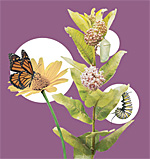Salinity Problems for Urban Soils
 Special to Road Trips for Gardeners
Special to Road Trips for Gardeners
BySoil Science Society of America
Some soils, like some humans, might need a low-salt diet. The February 1, 2019, “Soils Matter” blog by the The Soil Science Society of America (SSSA)explains where salt in soil comes from and what can be done about it.
“For humans, we think of salt as table salt (a.k.a. sodium chloride), but salts are made up of many more compounds than just those,” writes Meagan Hynes, a Certified Professional Soil Scientist with Teralytic. “You can have salts made up of calcium, magnesium, or potassium that are paired with chloride or other ions like sulfate.”
“Some salts are nutrients that plants need. We apply these salts as fertilizers in our yards to help plants grow. Addition of these nutrients can be very helpful, but only to a certain level,” Hynes says. “Both synthetic and organic fertilizers have the capability to add too many salts to the soil, so it is important that you apply appropriate amounts to your soil.”
Other salts occur naturally in the soil, and are slowly replenished. In urban settings, recycled irrigation water may contain higher salt levels. Salt spread on roads and sidewalks to deal with icy conditions also contribute to levels in the soil.
Plants have varying salt tolerances. There are signs that plants are affected by high salinity in soils. This is due to the decrease in energy the plant has for growth:
*Stunted size
*Blue-green tint to the leaves
*Leaf tips appear burned
*Younger leaves are yellow or wilting despite adequate watering
Hynes recommends submitting a soil sample to a lab for a salinity test. From there, appropriate actions can be taken depending on local conditions. “If all else fails, choosing plants for your yard that can endure higher salt content may help with an area that is beyond correcting,” she says.
To read the entire blog post, go online.
The photo, by Robert Zasoski, shows salt (white substance) contaminated soil from a pine-oak woodland in California.
The Soil Science Society of America (SSSA) is an international scientific society based in Madison, Wisconsin, that fosters the transfer of knowledge and practices to sustain global soils.







